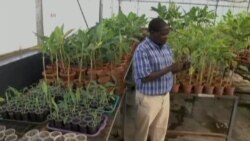A new report states that genetically-modified crops -- also known as GM crops -- would dramatically improve agriculture in Africa. The report, published by the policy group Chatham House, argues the technology is being held back by scaremongering from opponents.
Inside a temperature-regulated laboratory, scientists in Uganda are developing what they call a "golden banana" -- more hardy, and with higher levels of vitamins and minerals.
Priva Namanya, one of the researchers, said, “We have been able to show that we can in crease our vitamin A levels six times.”
Increased productivity
GM crops offer the best hope of increasing productivity and coping with climate change in Africa, according to the co-author of the Chatham House report, Rob Bailey.
“There is a whole host of GM crops in development in Africa specifically designed to address the needs of poor farmers and poor food consumers. Crops like cassava, sorghum, bananas, sweet potato, drought-tolerant maize. And it’s precisely these crops that are stuck at the field trial stage,” he said.
The reason, said Bailey, is that governments are reluctant to approve GM crops in the face of intense lobbying by opponents.
“They’ve created anti-GM campaigns based on misinformation. So for example, alleging a link between GM crops and infertility, or cancer, or animal deformities. None of which is true, there’s no evidence for any of this,” he said.
Opponents argue GM crops are expensive to produce, do not bring higher yields, and introduce more chemicals into the environment. And they say companies promoting GM crops are more interested in profits than in helping poor farmers produce food.
On the outskirts of the Ghanaian capital Accra, farmer Tetteh Nartey grows pawpaw, maize and other vegetables, alongside a small dairy business. This year Ghana approved field trials for GM grains like cowpeas. Nartey thinks it's a bad idea.
“Anything that is not natural it has got its bad side, if it is not natural then be very careful because at the end of the day we start taking GM products, but who has done the research?” asked Nartey.
Critics sound off
Ghana’s government insists it has put in place stringent bio-safety laws. But increasing yields through GM crops is not the answer to food shortages in Africa, according to Soren Ambrose of Action Aid.
“It’s not so much the problem of producing food, as it is the problem of getting the food that is produced to the people who need it. The continent is very much still struggling with its road infrastructure, with its storage facilities for products and so on,” said Ambrose.
Millions of small-scale farmers contribute to African agriculture. Campaigners like Bernard Guri of Ghana’s Center for Indigenous Knowledge fear the introduction of GM crops could drive those farmers out of business.
“This is against our sovereignty, it is another form of colonialism where gradually the developed world is conspiring to take over our food system in terms of taking over our land, taking over our seed, and taking over the whole farming food system,” said Guri.
But if one African country did approve GM crops, others would quickly follow, said Bailey of Chatham House.
“It would become apparent that they’re very useful, that they are potentially higher yielding, that they have resistance to pests of diseases, and consumers could see that they’re not a threat to their health. Then that could unlock a positive chain and you could see GM crops being taken up elsewhere.”
Supporters of GM crops argue they could trigger a green revolution in African agriculture. But there are still many who remain unconvinced.





